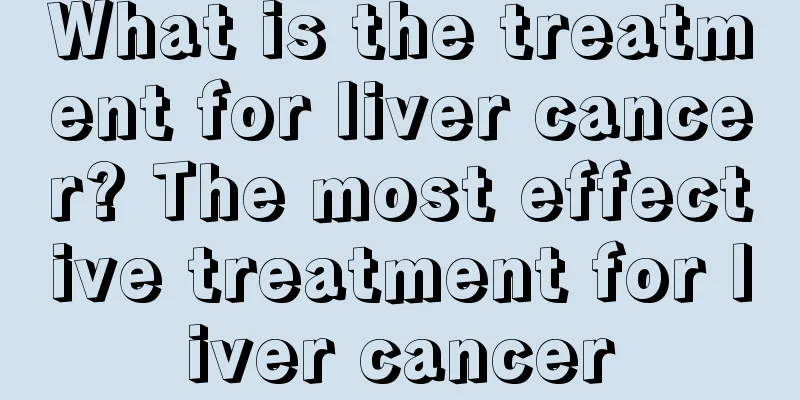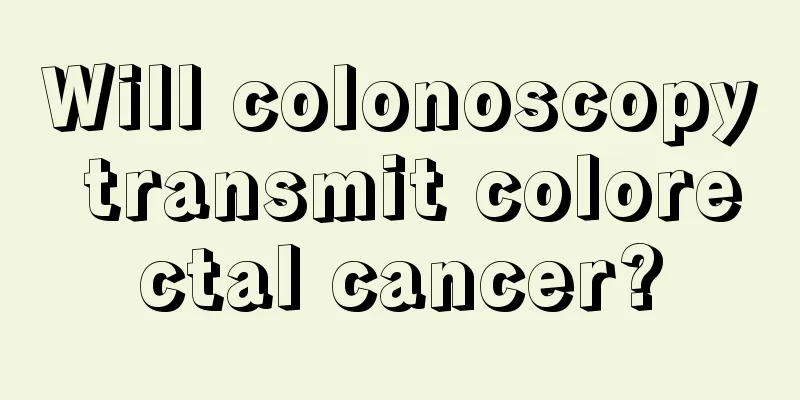What is the treatment for liver cancer? The most effective treatment for liver cancer

|
After surgical resection, if there is residual cancer at the resection margin, postoperative radiotherapy or intra-arterial chemotherapy should be considered. For patients with intravascular cancer thrombus, postoperative Chinese medicine treatment, immunotherapy, intra-hepatic arterial chemotherapy, and systemic chemotherapy can also be considered. The treatment of liver cancer needs to be based on the patient's specific condition. This mainly means that the treatment methods at different stages will also be different. For example, mid-stage liver cancer is not suitable for surgical treatment under special circumstances. Therefore, other methods are adopted. However, if surgical treatment can be chosen, then surgical treatment is still the preferred treatment method. The following is a summary of the treatment methods for liver cancer: Early liver cancer: If the liver cancer is relatively localized, the liver function is normal, and the cirrhosis is not severe, surgical resection is the first choice. If the liver function is abnormal, traditional Chinese medicine or Western medicine can be used to protect the liver first, and surgery can be considered after the liver function recovers. After surgical resection, if there is residual cancer at the resection margin, postoperative radiotherapy or intra-arterial chemotherapy should be considered. For patients with intravascular cancer thrombi, postoperative Chinese medicine treatment, immunotherapy, intra-hepatic artery chemotherapy, and systemic chemotherapy can also be considered. If the postoperative resection margin is negative for residual cancer and no cancer thrombi are found in the portal vein, postoperative Chinese medicine or biological therapy can be used to improve long-term efficacy. Mid-stage liver cancer: For mid-stage liver cancer with normal liver function, we strive for radical resection. If it is estimated that resection is impossible before surgery, we can also perform transhepatic artery embolization, local radiotherapy, biological therapy or traditional Chinese medicine treatment, and strive for surgical resection after the tumor shrinks. For patients who are difficult to operate on or cannot undergo surgery, have normal liver function, and have mild cirrhosis, if the liver cancer is localized and the size is about 8-10cm, radiotherapy can be used. During radiotherapy, Chinese medicine can be taken at the same time. For patients with localized liver cancer tumors that are larger than 13cm, interventional treatment can be considered first, with intra-arterial injection of chemotherapy drugs or embolization, and radiotherapy can be performed after the liver cancer shrinks. Traditional Chinese medicine can also be used for treatment. Since interventional treatment is effective for a short time and the long-term efficacy is not high, after interventional treatment, if the liver cancer shrinks, it should be combined with surgical resection or radiotherapy to improve the long-term efficacy. Liver transplantation is suitable for patients with advanced liver cancer: In the close follow-up of patients with primary liver cancer and non-liver cancer who underwent liver transplantation, from the perspective of the safety of the transplantation operation, although the condition of patients with advanced liver cancer deteriorates rapidly, it is not equivalent to liver failure. In addition, because the coagulation function of patients in the liver cancer group is significantly better than that of the non-liver cancer group, the intraoperative blood loss, blood transfusion volume and total infusion volume are all less, the hypotension time caused by bleeding is short, the intraoperative process is smooth, the postoperative recovery is significantly better than that of the non-liver cancer group, and the perioperative mortality rate is also lower. During the treatment process, it is very important to use Chinese medicine to improve physical fitness, liver immunity, and function. However, if it is in the later stage, although this method is still very good, the effect is no longer obvious. This is the characteristic of cancer, and it can be said that there is nothing we can do. Therefore, there must be scientific prevention methods and timely detection of the disease. |
>>: What are the uncommon symptoms of lung cancer? These lung cancer symptoms are not easy to detect
Recommend
Is glucose good for treating jaundice?
Jaundice is a disease caused by increased bilirub...
How can liver cancer be diagnosed more accurately? Pay attention to two aspects when diagnosing liver cancer
1. Medical diagnosis 1. Nuclear Magnetic Resonanc...
What causes bloodshot eyes? Is it a disease?
I believe many of my friends have experienced blo...
Can mung beans still be eaten after being stored for a year?
Mung beans can be eaten even after a year. As lon...
What makes you age? Various reasons for aging in the city
Everyone will feel scared when hearing the word &...
Which hospital is good at treating multiple brain tumors
Which hospital is good at treating multiple brain...
Tips for ear protection
The ear is a very important organ of the human bo...
Is it okay to drink brown sugar water to replenish qi and blood?
Many of my friends know how to make brown sugar w...
What is the reason for lower back pain after uterine curettage
Curettage is a very common method of abortion, wh...
Can appendicitis cause infertility
Appendicitis is not unfamiliar to many people. It...
Are there any side effects of taking Xiaoer Qizhen Dan
Nowadays, people eat more and more types of food,...
What are the early symptoms of prostate cancer? Four major symptoms to watch out for
Prostate cancer is a malignant tumor disease that...
Does Slim Enzyme Green Plum have any side effects?
Nowadays, many people take some slimming and weig...
What should I pay attention to when using diapers for my baby girl?
When parents buy diapers, they must consider the ...
What to do if nasopharyngeal carcinoma recurs in the neck and how to treat it
What should I do if nasopharyngeal carcinoma recu...









